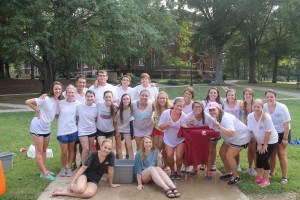Presbyterian College Staff Member Published
Presbyterian Colle ge’s Annalise Sinclair, assistant director of student involvement and Greek life recently wrote a chapter for the Student Affairs Collective book, Beyond Meetings: Lessons and Success in Advising Student Organizations.
ge’s Annalise Sinclair, assistant director of student involvement and Greek life recently wrote a chapter for the Student Affairs Collective book, Beyond Meetings: Lessons and Success in Advising Student Organizations.
The book is a collection of essays in which each individual author takes on a unique perspective in regards to advising student organizations. The editors from the Student Affairs Collective describe it as being created in hopes that the book will share the stories of successes and challenges in the student advising role, in the name of opening conversation about how to maximize the educational impact of the advising role.
Sinclair’s chapter, “A Little Risky Business” describes her first year as assistant director of student involvement and Greek life, and her experiences as the adviser for the College’s Student Activity Board. She explains that upon coming to PC, Sinclair expected she “would have an army of students to help imagine, organize and implement” all of the programs sponsored by the Student Activities Board. She was then surprised to find out that only four students were a part of the organization.
In the essay, Sinclair depicts how the organization grew to 15 members in the first semester, and how they changed programming by facing challenges associated with breaking tradition. Sinclair states that the changes occurred after she had the students answer a single question, “What would you do if there were no expectations, no boundaries, and no fear of failure?”
Erika Godfredson, a senior English major from Duluth, Ga., and president of the Student Activities Board explained that some of the changes the organization underwent with Sinclair’s advice included moving from an expectation to put on small events almost every weekend to a new model with one or two large events hosted each month. These changes, she explained, showed an immediate increase in student involvement from five to 10 students per event to more than 50 in some cases.
